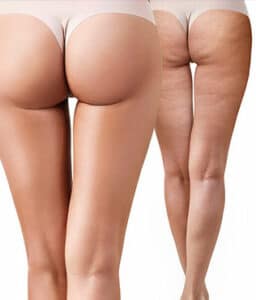What is collagen and why it is needed for our skin, hair, nails, joints…
We want to look and feel better, and we are willing to do a lot to achieve this. Even add collagen powder to your morning coffee or tea.
Maybe that's right …
There are really many different collagen products, including supplements.
However, most people do not know what collagen really is and why we need it.
Then let's start with that.
What is collagen?
Collagen is a type of protein found in connective tissue, skin, tendons, bones and cartilage. Collagen is the most common structural protein that forms the structure of our cells and tissues, holding together the cells of our body and playing an important role in cellular processes, including:
- Tissue regeneration processes;
- Immune responses;
- Intercellular communication;
- Cell migration processes (old or damaged cells are replaced with newly created cells).
Collagen makes up one-third of the total weight of all proteins in the human body and three-quarters of the dry weight of the skin.
Collagen consists of three chains twisted in a tight triple helix. Each chain is more than 1400 amino acids long (they can be repeated several times)!
The most important amino acids in collagen are:
- Proline - makes up almost 15 percent of collagen. Proline helps protect vascular integrity, and improves joint and cardiovascular health;
- Glycine - makes up about a third of all collagen proteins. Even though it is the smallest amino acid in size, glycine has a great influence. Glycine helps build healthy DNA strands. It is also one of the three amino acids that make up creatine, which promotes healthy muscle growth and increases the amount of energy available during exercise.
- Glutamine - is considered one of the most important amino acids in our body. Studies show that glutamine helps prevent anxiety, tension, and sleep disorders, improves concentration and immunity, and increases energy levels. Nitrogen, produced in large amounts by glutamine, helps heal wounds and prevents muscle wasting and joint pain.
- Arginine (also called L-arginine) in our body is converted to nitric oxide, which is important for our blood vessels and heart health. L-arginine also stimulates the release of growth hormone and insulin in the body, helps strengthen the immune system and has a positive effect on male libido.
Types of collagen
There are 28 known types of collagen, the most common of which are:
- Type I - this is the most abundant collagen in the human body (about 90%). It is resistant to stretching and is found mainly in the skin (dermis), tendons, ligaments, fascia, capsules of organs, blood vessels, gastrointestinal tract, sclera, cornea and fibrous cartilage. Type 1 collagen is also very important for wound healing, gives skin elasticity, and holds tissues together to prevent them from tearing;
- Type II - resistant to compression. It is found in the vitreous body of the eye and cartilage. Type 2 collagen is essential for the health of our joints (it makes up 50% of all cartilage proteins and 85-90% of the collagen in articular cartilage);
- Type III - is found in reticular tissues/fibers (acts as a support network in soft tissues such as the liver, bone marrow, tissues of the lymphatic system and organs). It is also present in the skin, the walls of blood vessels, and all blood-forming organs (except the thymus). The third type of collagen is a major component of the extracellular matrix. It is commonly found together with type 1 collagen and helps to give the skin elasticity and firmness;
- Type IV - not fibrous but reticulated. Type 4 collagen is an important component of the basal lamina (a thin gel-like layer that provides cushioning of the tissue above it);
- Type V - this collagen is needed to form the cell surface, hair and placental tissue;
- Type X - this collagen is necessary for the formation of cartilage in bones and joints. Type 10 collagen has been found to promote the healing of synovial joints and bone fractures.
As you can see, healthy collagen levels in our body are very important.
Collagen is produced by connective tissue cells called fibroblasts. As people get older, the level of collagen synthesis in the body decreases, and the collagen fibers become thinner and weaker. This, together with the loss of the other main structural protein, elastin, causes signs of aging, such as a decrease in skin elasticity and sagging, wrinkles, and so on.
What causes collagen loss?
Factors that can cause collagen loss or low collagen levels include:
- Hormonal changes due to pregnancy, menopause, health condition and other reasons;
- Oxidative stress, caused by metabolic processes and lifestyle, such as smoking and/or unhealthy diet;
- Aging of the body;
- Too much sunlight, because ultraviolet rays can cause the destruction of collagen in the skin;
- Low levels of Vitamin C , which can cause scurvy.
Collagen production can also be affected by genetic diseases such as:
How to reduce collagen loss?
The short answer is - a healthy diet and lifestyle:
- Eat lots of fruits and vegetables because they contain vitamins needed to produce collagen and antioxidants that inhibit the oxidation of collagen molecules;
- Avoid smoking and ultra-processed foods that increase the risk of oxidative stress;
- Protect your skin from the sun.
A decrease in collagen levels can also be caused by improper nutrition – when the body consumes more protein than it receives with food.
Sources of collagen
Collagen is found in all animals, but it is concentrated in parts that we rarely eat, such as bones, cartilage, the skin of animals, birds and fish.
Our body naturally produces collagen from amino acids. Accordingly, it is possible to support the production of collagen by providing the body with a sufficient amount of protein, vitamin C and other components necessary for its production.
Poultry, fish, beans, eggs, citrus fruits, peppers, greens, and berries are best suited for this purpose.
Some types of collagen are resorbable - they can be broken down, transformed, and re-absorbed into our bodies when eaten.
Accordingly, collagen can be produced industrially from natural raw materials. And the result will be very similar to natural human collagen.
The type and effect of collagen in the final product also vary depending on the raw materials used in production:
- Bovine collagen. Produced from the offal of bovine animals. Mostly cowhide, bones, and muscles. Mainly type 1 and type 3 collagen is obtained. It is rich in glycine and proline and is therefore useful for creatine production, and muscle building and also helps the body to produce its own collagen;
- Chicken collagen. It is mainly produced from the skin and bones of chickens (and other birds). This collagen contains mostly type 2 collagen, which is beneficial for joint health - formation/maintenance of cartilage (reduction of joint pain). It also provides our body with chondroitin sulfate and glucosamine sulfate, both of which have a rejuvenating effect;
- Fish or marine collagen. It is made from fish skin and scales, as well as marine invertebrates such as sea sponges or jellyfish. Basically, type 1 collagen is produced, which provides us with glycine, proline, and hydroxyproline and has a beneficial effect on our joints, skin, blood vessels, bones, and digestive tract. It is believed that fish collagen is more efficiently absorbed by the body and has better bioavailability than bovine or porcine collagen.
- Eggshell membrane collagen. It is found in eggshells and whites. It consists predominantly of type 1 collagen with small amounts of type 3, 4, and 10 collagen. It provides us with glucosamine sulfate, chondroitin sulfate, hyaluronic acid, and amino acids needed for connective tissue, wound healing, muscle building, and pain/stiffness relief.
Collagen is also obtained from pig offal, yeasts, bacterial synthesis, etc.
Collagen can also be obtained at home, for example, bone broth is a very good source of type 1 collagen.
Use of collagen in medicine and cosmetics
Collagen has long been used in various cosmetics to restore and/or maintain skin elasticity. When applied externally, collagen acts only on the upper layer of the skin, attracting moisture and thereby making the skin smoother.
The collagen molecule is too large and complicated to pass through the skin.
There are also collagen injections that give a more lasting result, but they also work only locally.
When taking collagen orally, this problem persists because our digestive tract cannot completely break down complex collagen molecules. Consequently, they also cannot be absorbed so well and bring tangible benefits to our bodies.
Therefore, collagen is hydrolyzed during the production process - the complex collagen molecule is broken down into hydrolysates, peptides (tripeptides, dipeptides) and amino acids.
Hydrolyzed collagen preparations are much better absorbed in our intestinal tract and act not only locally but on the body as a whole.
Again, the labels -😊 must be read carefully
Look for terms like "collagen peptides," "collagen hydrolysate," or "hydrolyzed collagen."
Skin fillers
Fillers that combine collagen dermal fillers with hyaluronic acid can increase skin elasticity by promoting collagen production and increasing the size of tissues, thus:
- Improving skin elasticity;
- Smoothing the skin/reducing wrinkles;
- Improving the appearance of scars.
Allergic reactions and the origin of the product must be checked before use.
Wound dressing
Collagen plays a key role in the natural wound healing process, so with its help, it is possible to:
- Control/reduce bleeding;
- Reduce inflammation;
- Improve vascular health and function;
- Increase the strength of scar tissue;
- Restore skin elasticity;
- Promote wound healing.
Collagen wound dressings contain collagen and other substances designed to promote healing and are available as:
- Bandages, patches, sponges;
- Jellies;
- Powders.
Guided tissue regeneration
Collagen-containing membranes, stoppers, or pads can help provide temporary support while the body produces new cells during the healing process.
Researches shows that in oral surgery, collagen barriers can prevent the migration of rapidly growing cells around the gum to the tooth wound. This preserves the place where the tooth cells can regenerate.
The best part is that these materials do not need to be surgically removed after healing, as they are absorbed and disappear over time.
Treatment of osteoarthritis
Collagen is the most important component of healthy bones and cartilage.
Many people report that the use of dietary supplements containing collagen hydrolyzate helps them to reduce the symptoms of osteoarthritis.
This is also confirmed studies, half of the participants took oral dietary supplements containing collagen for 90 days, and the other half took a placebo. For those who took collagen, joint pain decreased by 43%, and joint mobility improved by 39%.
Skin revitalization
Increasing or preventing a decrease in collagen levels can help reduce the signs of aging and keep the skin strong and supple for longer.
This can be done with:
- Surgical treatments, such as injection of fillers;
- Application of creams and other products;
- Oral supplements containing hydrolyzed bioactive collagen peptides, vitamins, and antioxidants;
- Nutrition that provides essential nutrients, vitamins, and antioxidants;
- Preventing/reducing oxidative stress, such as quitting smoking.
Do collagen supplements have side effects?
Collagen itself is not associated with adverse side effects.
However, manufacturers of collagen supplements/nutritional supplements often combine collagen with other ingredients.
Some supplements that are designed to support skin, nail and hair health are high in herbs and vitamins. Prolonged use of such supplements can cause various health problems..
Dietary supplements containing plant extracts may interact with the medicine prescribed to you. You should also pay attention to whether they are safe for pregnant or breastfeeding women.
Some supplements contain a lot of biotin, which can interfere with laboratory tests of heart and thyroid function.
So, although collagen-only supplements are unlikely to cause any side effects, it is important to read the labels and understand the potential risks. Especially if you are taking medication, are pregnant, or breastfeeding.
How much collagen should be taken a day?
Although there are several types of collagen supplements, the most commonly used are:
- Hydrolysed collagen (collagen hydrolyzate). Obtained from cattle, seafood, poultry, pigs and other animal sources. Collagen is broken down into peptides and amino acids to make it easier for the body to absorb;
- Undenatured collagen or raw collagen obtained from chicken cartilage;
- Gelatin. Animal collagen commonly used in desserts.
Collagen doses
There are currently no official guidelines on how much collagen to take in per day.
The amount of collagen you need depends on the type of collagen you are taking and why you are taking it.
Hydrolysed collagen
It is one of the most common types of collagen in food supplements because it is absorbed more easily than others.
It is usually sold in capsule or powder form. The powder can be added to both hot and cold drinks, soups and even confectionery and other foods.
In 2019, a review of clinical trials found that daily use of 2.5-15 grams of hydrolyzed collagen peptides is safe and effective.
2.5 grams per day can reduce joint pain, improve skin health and skin hydration.
5 grams per day can improve bone density.
Higher doses - around 15 grams per day are mainly used to increase muscle mass and change body composition.
Undenatured/unprocessed collagen
Some studies in humans show that 10-40 mg of undenatured collagen per day can improve joint health.
Gelatin
Gelatin is rarely included in food supplements. It is used more for making various desserts.
It can also be added to sauces, soups, cocktails…
There are few studies on the effects and doses of gelatin, so it is not possible to make specific recommendations on recommended doses.
Can I take in too much collagen?
Collagen is considered a safe and non-toxic daily dietary supplement for healthy people and most do not experience any side effects.
However, there have been some reports of symptoms such as unpleasant taste, excessive satiety, or other indigestion.
Therefore, if you plan to take more collagen than recommended, talk to your doctor.
Key takeaways
Collagen provides structural support to tissues and is also involved in important body processes, including tissue regeneration and the transmission of signals between cells.
Our body synthesizes collagen, but age-related collagen loss is inevitable. Therefore, to prevent the signs of aging and promote overall health, we can:
- Pay more attention to what we eat and choose nutrient-rich foods that can naturally stimulate collagen synthesis in our body;
- Increase collagen levels with collagen supplements.
Studies show that the use of collagen is particularly useful in increasing bone mineral density in postmenopausal women and people with low bone mineral density.
According to some researchers, the consumption of hydrolyzed collagen and certain nutrients can also help prevent collagen loss or increase the production of natural collagen.
Adequate intake of protein, vitamin C, vitamin D and zinc in a balanced diet is a healthy and also cheaper alternative to food supplements. By combining it with regular physical activity, you can reduce collagen loss with age.
Manufacturers of creams, powders, and other collagen-containing cosmetics claim that the products they offer "revitalize" the skin by increasing collagen levels in the body. However, there is no evidence that the skin is able to absorb the required ingredients in a way/amount that would significantly alter the appearance of the skin.
Sources:
COLLAGEN STRUCTURE AND STABILITY
Impact of Smoking and Alcohol Use on Facial Aging in Women
Sugar Sag: Glycation and the Role of Diet in Aging Skin
Diet and Skin Aging — From the Perspective of Food Nutrition
The Roles of Vitamin C in Skin Health
Marine Collagen from Alternative and Sustainable Sources
Specific Bioactive Collagen Peptides in Osteopenia and Osteoporosis
Specific Collagen Peptides Improve Bone Mineral Density and Bone Markers in Postmenopausal Women
Advanced Glycation End Products in Foods and a Practical Guide to Their Reduction in the Diet
Effects of hydrolyzed collagen supplementation on skin aging
Enzymatic Hydrolysis of a Collagen Hydrolysate Enhances Postprandial Absorption Rate
The Effects Of Skin Aging Associated With The Use Of BioCell Collagen
A Collagen Supplement Improves Skin Hydration, Elasticity, Roughness, and Density
Functional and bioactive properties of collagen and gelatin from alternative sources
Specific Collagen Peptides Improve Bone Mineral Density and Bone Markers in Postmenopausal Women
Safety and efficacy of undenatured type II collagen in the treatment of osteoarthritis of the knee
Share this article
Follow me on Facebook
I recommend reading these articles as well

How to become happy?
How to become more beautiful and happier. Women's stories about how they have found a healthier relationship with food, their body and life in general.


How to start exercising - if you don't like to exercise?
How to start playing sports - exercise, jogging or just walking to get those 10 000 steps a day and improve your well-being and health?

Cellulite - how it occurs and how to get rid of it
Everything you need to know about cellulite if you want to get rid of it. Causes of cellulite, influencing factors and treatment methods.

